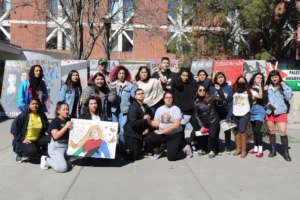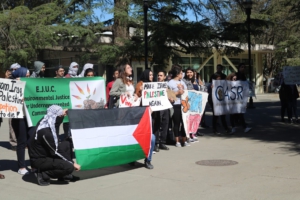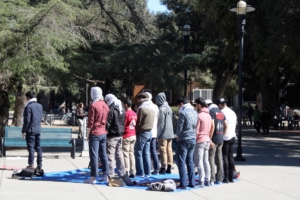
SPEAK FREELY — BUT BE WATCHED
This Monday, a diverse group of student activists came together to build a mock-apartheid wall at the Memorial Union. The wall was intended to represent the similar structure that cleaves the Palestinian West Bank today. The powerful symbolism is clear — whether in Palestine or Mexico, the construction of these physical structures are a stark reminder of our tendency to “otherize” and “dehumanize” humanity for political purposes.
The wall and the subsequent demonstration is, and should be seen as, a bright source of pride for students on campus. It is a reminder that the powerful ideals of principled activism and fiery commitment for change is well and alive at the University.

What is disappointing, however, is the quiet, ominous atmosphere of fear that swirls behind-the-organizing-scenes of such demonstrations. Despite promises of their right to unequivocal “free speech”, in reality many students are threatened relentlessly by the concept of being put on campus ‘watchlists’. These watchlists — exploding recently in popularity on university campuses, especially post-BDS — aim to keep close surveillance on students. Or simply put, they essentially serve to try and intimidate campus activists from speaking certain political views.
Prominent among these watchlists is the infamous Canary Mission. The organization claims to document “…individuals and organizations that promote hatred of the USA, Israel and Jews on North American college campuses.” In reality, the organization is little more than a blunt, archaic propaganda weapon — designed to spread fear and crush free speech on college campuses like ours.
The fear of these watchlists is far-reaching and tendril-like; it at once puts more pressure on activist leaders organizing, and discourages those who are more unsure from joining. Individuals who are on watchlists like Canary Mission — often for nothing more than joining registered student organizations or speaking their political views, on campuses that are ostensibly the birthplace of ‘free speech’ — run the risk of being blacklisted from jobs, having difficulty during traveling, or even being refused entrance into Palestine.

What is perhaps most disturbing is that certain student organizations on our campus help strengthen and perpetuate this watchlist system. In a chillingly McCarthy-esque tone, Canary openly invites students to ‘expose hatred’ and raise the ‘alarms’ on other students who may be mobilizing for a cause they disagree with. Thus it is not uncommon for events about Palestine to be swarmed by students equipped with body cameras or other recording devices; the threat of Canary hanging silently in the air. What purpose does such action serve but as a blatant attempt to intimidate and silence the other side?
Neither watchlists like Canary nor student organizations that help perpetuate it will be enough to stop activism from gaining momentum. Neither the fear of being blacklisted, nor subtly threatened by fellow students will be enough to crush the commitment to speak and advocate freely on our own campuses. The passion is too bright, and the causes are too strong.
But watchlists like these remind us of the many ways — directly or indirectly — fear can be spread, and our core freedoms threatened. And they remind us of how, for many students, ‘free’ speech will continue to only come at a high, high price.






